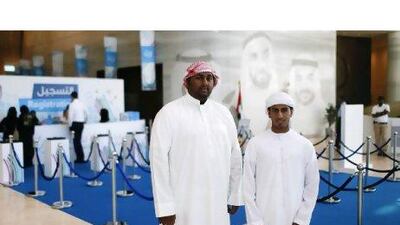ABU DHABI // Waleed Al Jberi and Mohamed Al Messabi are weighing the advantages of public and private-sector jobs, even though they are still in their first year of university.
The two Abu Dhabi Men's College students were among hundreds of young Emiratis looking for guidance and inspiration at Mubadala's second annual Youth Forum at Zayed University last week.
"Passion for my future, motivation and to learn from all the experience around is why I'm here," said Mr Al Jberi, 22, who is majoring in public relations and also attended the forum last year.
Designed to spur Emirati students to consider the private sector when starting their careers, the forum gave students the chance to interact with Emiratis who had enjoyed success in non-government companies.
It confirmed Mr Al Jberi's desire to work for a private employer.
"Private companies will give me an opportunity to meet new people, as most of the people in the public sector are locals," he said.
Mr Al Messabi, 21, said the forum showed the private sector gave Emiratis more opportunities to advance, but that this view was not shared by most UAE national students.
"Many don't want to work in the private sector because they are uncomfortable with the idea of working with many foreigners," he said. "They know the public sector is full of Emiratis who share the same language, culture and values."
Mr Al Messabi said the misconception held by many Emiratis, including him before the forum, that only jobs in the public sector were of benefit to the nation also swayed students' decision. "I thought private companies only served themselves and not the country, but this event has shown me it is important for Emiratis to seek these jobs," he said.
Mohammed Younus is a rare example of a UAE national who has worked for a private company since leaving high school, and says more Emiratis should follow his example.
"Eventually Emiratis will be forced to work for the private sector," said Mr Younus, 25.
He has worked for a medical-research company in Dubai for the past six years, but said 90 per cent of Emiratis he knew worked in the public sector. "We can't have all Emiratis working for the Government," Mr Younus said. "They should know working in private companies offers more opportunity for growth while you can be more productive."
But Mohammed Al Suwaidi, 30, who made the switch from a private company, the telecommunications carrier du, to a public-sector job at the Abu Dhabi Educational Council, said the idea that all government jobs were easy was far from true.
"At times during Ramadan I was leaving work for a few hours to break fast and early-morning congregational prayers, while sometimes not finishing my work project until 5am," Mr Al Suwaidi said.
Having to adjust from a work environment where Emiratis are in the minority to one with only a few expatriates proved challenging for him at first.
"It's completely different to interact with Emiratis outside the office and then have to deal with them on a professional level," Mr Al Suwaidi said.
"Our culture plays a significant role in the work environment."
He said although it was harder to motivate people and get things done at his present job, he felt more fulfilled there.
"In the private setting the motivation is profit, whereas in the Government it's duty and responsibility to the country," Mr Al Suwaidi said. "But I miss little things about my old job, like getting my own coffee, which was much easier at du. I'm getting lazy in this job."
He recommended that regardless of which sector they choose, graduates should search for a job that best fits them and be patient in the beginning.
Mr Al Suwaidi believes opportunities for Emiratis are plentiful in both sectors, so graduates should not limit their search.
"Many Emiratis say there are no places to work," Mr Al Jberi added. "I say be active, go out there and knock on some doors. Do not rule out the private-sector jobs.
"The country has done a lot for us, so we have to give back by working hard wherever we land."

